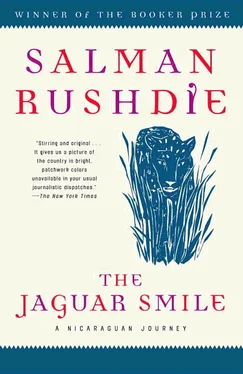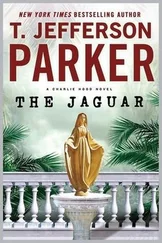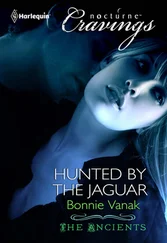She spoke of belonging to a ‘sacrificed generation’, for whom the work of rebuilding the nation had to take priority over their private needs as poets. It was the kind of statement one might perhaps have expected from a woman whose revolutionary motivation was essentially religious in origin, as Meneses’ certainly was. But Gioconda Belli, a far more secular poet, made very similar remarks to Margaret Randall. She had just decided, she said, to make her work (for the revolution) ‘the best poem I can write.’
Belli’s poems closed the evening. She had created a kind of public love-poetry that came closer, I thought, to expressing the passion of Nicaragua than anything I had yet heard:
Rivers run through me
mountains bore into my body
and the geography of this country
begins forming in me
turning me into lakes, chasms, ravines,
earth for sowing love
opening like a furrow
filling me with a longing to live
to see it free, beautiful,
full of smiles.
I want to explode with love…
4

MADAME SOMOZA’S BATHROOM
It had become the custom, when young writers gathered in the cafés of Managua, to rubbish Ernesto Cardenal. As Father Cardenal was not only the country’s most internationally renowned poet, but also the Minister of Culture, I took these attacks to be indications that the country’s literature was in reasonably healthy and irreverent shape. The coffee-shop sniping didn’t seem to bother Cardenal much. He just went on beaming away, looking, with his little beret and his silver locks and beard, and his cotona , the loose peasant’s smock he wore over his blue jeans, like a Garry Trudeau cartoon of himself: the radical Latino priest according to ‘Doonesbury.’
The attack that did upset Cardenal, and many Nicaraguans along with him, was the Pope’s. The story of Wojtyla’s arrival in Managua had passed into legend: Cardenal knelt to kiss the Pontiff’s ring, but John Paul II shook angry fists at him and commanded him to regularize his relationship with the Church. The poet burst into tears.
At the time of my visit, neither Ernesto Cardenal nor the other priest high in the government, the Foreign Minister, Miguel d’Escoto, were permitted to officiate at the Mass. They were, in effect, suspended. As I read Cardenal’s poem The Meaning of Solentiname , some of the reasons for this rift in the Church became clear:
Twelve years ago I went to Solentiname with two
brothers
in Christ
to found a small contemplative community…
contemplation
brought us to the revolution;
and thus it had to be
because in Latin America
a man of contemplation cannot turn his back
on political struggle…
What most radicalized us politically were
the Gospels .
At mass, we discussed the Gospels
with the peasants
in the form of a dialogue ,
and they began to understand the essence of the
divine
message :
the heralding of God’s kingdom ,
Which is: the establishment on earth of a just
society…
At first we had preferred to make
a non-violent revolution .
But later we came to understand
that right now, in Nicaragua ,
non-violent struggle is not possible…
Now everything has come to an end in our
community .
Solentiname
was like a paradise
but in Nicaragua
paradise is not yet possible .
I met Cardenal in Hope Somoza’s bathroom. The Ministry of Culture occupies what used to be the dictator’s residence, and the Minister’s office, he gleefully informed me, had once witnessed Mme Somoza’s daily toilette . Had he ever been here, I asked, in the bad old days? No, no, he exclaimed, throwing up his hands in a parody of what would once have been perfectly legitimate terror. ‘In those days the place was surrounded by guns, tanks, helicopters. It was frightening just being in the neighbourhood.’ I told him of my own experience of being in the neighbourhood of a Somoza, and he was delighted. ‘Then you know everything.’
He showed me round. ‘This was the bar. That is the Japanese house which Hope Somoza liked to use for her meditating. Here, for the guards, and here, for the horses.’ Concrete tennis courts cracked and decayed in the rain. I felt that the re-allocation of this house of barbarity to the Ministry of Culture was a particularly elegant revenge, and so, clearly, did Cardenal.
Back in Hope’s bathroom we discussed his development as a poet. There was the early influence of Neruda — ‘his lyric mode, not the political stuff’ — and, later, the much more profound impact of North America: Pound, Whitman, Marianne Moore. We also talked about the parallel development of his political radicalism. ‘In the beginning I was a sort of Christian Democrat. I had many arguments with Carlos Fonseca and the others. I was against the revolutionary route at that time. They were always very patient with me, very gentle.’ This, after all, was a man who had entered a Trappist monastery when he was thirty-one. Revolution did not come naturally to such an inward, contemplative spirit.
The turning-point was his visit to Cuba, immediately after the revolution there. ‘It was a conversion,’ he said. ‘When I got back, I announced that I had been converted. It created a great scandal.’ He beamed happily at the memory of it.
I said I could understand his conversion easily enough; the Cuban revolution had clearly been a great event for the whole of Latin America, an affirmation of possibility, a demonstration that oppressors could be overthrown. But now, I added, I had serious reservations about Cuba. Did he share any of these reservations? Did he feel, for example, that the Cuban revolution had taken some wrong turnings, and that it could serve, for Nicaragua, as a warning as well as an inspiration?
‘No,’ he said, with a radiant smile. ‘Why? What wrong turnings?’
All right, I thought, he’s the Minister of Culture, he doesn’t want to find Cardenal Attacks Cuba splashed across the world’s papers the day after tomorrow. But he was a writer, too… I took a deep breath and mentioned, er, for example, human rights abuses? Political prisoners, torture, attacks on homosexuals, on, um, writers ?
‘What attacks?’
His serenity threw me into a spin. Confused, I stupidly said, ‘Well, for example, on Nicolás Guillén,’ who is the head of the Cuban Writers’ Union, when I had meant to say, ‘Padilla.’ He looked at me scornfully. ‘In the early days there were a few abuses,’ he said. ‘But not now.’ I asked a few more questions — what about Armando Valladares’ book, Against All Hope , which speaks of over two decades in Cuban prisons, two decades of being made to eat shit and drink soup containing bits of glass? But it was like hitting a wall.
When I left the Ministry of Culture I noticed that the Nicaraguan fondness for naming their ministries acronymically had created, in this instance, an unfortunately Orwellian resonance. Cardenal, chief of MINICULT. I went away feeling depressed.
I had lunch with a man from the FSLN’s newspaper, Barricada . He was responsible for the ‘Editorial’ page, and I have forgotten his name, which is perhaps just as well, because he made the most chilling remark I heard in Nicaragua. I was arguing with him about censorship in general and the recent closure of La Prensa in particular. He seemed, at first, genuinely opposed to censorship — ‘of course, as a working journalist, I hate it too’ — but then he said this: ‘A worker I met recently put it very well. If a mother has a sick child, very sick, she takes it to the hospital without first putting on her make-up.’
Читать дальше












